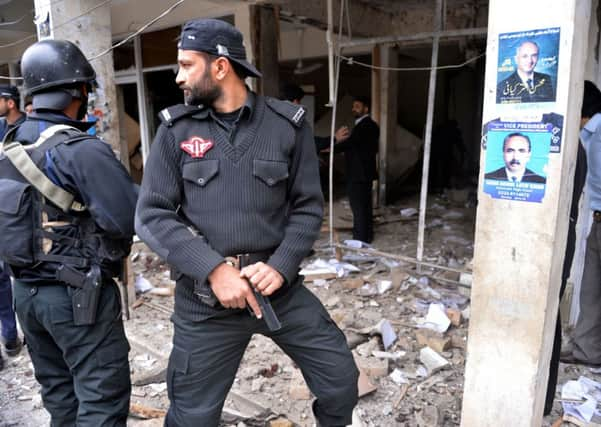Pakistan: 11 killed as armed gang storms court


No one immediately claimed responsibility for the assault, which came just days after the Pakistani Taleban announced a one-month ceasefire, raising questions about the group’s ability to control its various factions.
Prime Minister Nawaz Sharif has been trying to negotiate a peace settlement with militants in the north-west who have waged a bloody war against the government for years.
Advertisement
Hide AdAdvertisement
Hide AdWitnesses spoke of attackers wielding automatic weapons running into the narrow alleyways in the sleepy capital’s court complex, hurling grenades and opening fire on lawyers, judges and court personnel.
One lawyer described it as a scene from hell, with blasts and firing all around. “My colleague was shot, and there was no one to help him. When I reached him, he was bleeding and crying for help,” said Momin Ali.
There were conflicting reports on how many attackers were involved in the incident and whether any managed to escape from the police. It also remained unclear if anyone had been arrested, how the attackers penetrated so deep into the city and whether a specific person in the complex was the target.
Initial reports suggested two men wearing explosive vests rushed into the court complex, threw hand grenades and started shooting, then blew themselves up, said Islamabad Police Chief Sikander Hayat. He put the death toll at 11.
“It was certainly an act of terrorism,” Mr Hayat said. One of the attackers blew himself up outside the office of the lawyers’ union president and the other outside the door of a judge’s office, he added. The explosions sent lawyers and judges running in fear for their lives as police stormed in.
Other officials and a lawyer on the scene said there were more than two attackers. Police official Jamil Hashmi said there were about six to eight attackers who spread into different areas of the court complex.
“One of the attackers entered a courtroom and shot and killed a judge,” Mr Hashmi said.
Lawyer Murad Ali said he saw several attackers walking toward a courtroom, brandishing weapons. “They had automatic weapons. They had hand grenades,” he said. “I saw them shooting a female lawyer.” His hands were spattered in blood which he said came from helping remove four dead bodies.
Advertisement
Hide AdAdvertisement
Hide AdThe dead included two judges and five lawyers, said Dr Altaf at the Pakistan Institute of Medical Sciences in Islamabad where the dead and wounded were taken. He said most of the victims had bullet wounds and 25 were wounded, five of them critically.
Pakistani TV showed images of the area where the attack took place with windows blown out, walls torn and lawyers in traditional black suits carrying bodies and wounded people from the buildings. The police cordoned off the complex, which was taken over by commandos from the police anti-terrorist force.
The attack was a shock to Islamabad, which has mostly been spared the frequent bombings and shootings prevalent in other parts of Pakistan.
The peace process has proceeded in fits and starts but seemed to get a boost on Saturday, when the Pakistani Taleban announced they would implement a one-month ceasefire after the military pounded their hideouts with airstrikes.
The militant group was quick to distance itself from yesterday’s attack. A spokesman told an Associated Press reporter that the group was not involved in the assault and restated his group’s commitment to the ceasefire.
But the attack highlighted the difficulty in negotiating a peace deal with a multi-faceted group like the Pakistani Taliban, made up of varying factions. Analysts say that while some in the group may want to negotiate a peace deal, other factions may not, making it difficult to enforce a peace deal across all the factions. The cease-fire did not include other groups, such as al-Qaida, that operate in Pakistan.